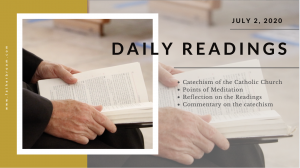
July 2 2020
Thursday of the Thirteenth Week in Ordinary Time
Reading 1 AM 7:10-17
Amaziah, the priest of Bethel, sent word to Jeroboam,
king of Israel:
“Amos has conspired against you here within Israel;
the country cannot endure all his words.
For this is what Amos says:
Jeroboam shall die by the sword,
and Israel shall surely be exiled from its land.”
To Amos, Amaziah said:
“Off with you, visionary, flee to the land of Judah!
There earn your bread by prophesying,
but never again prophesy in Bethel;
for it is the king’s sanctuary and a royal temple.”
Amos answered Amaziah, “I was no prophet,
nor have I belonged to a company of prophets;
I was a shepherd and a dresser of sycamores.
The LORD took me from following the flock, and said to me,
‘Go, prophesy to my people Israel.’
Now hear the word of the LORD!”
You say: prophesy not against Israel,
preach not against the house of Isaac.
Now thus says the LORD:
Your wife shall be made a harlot in the city,
and your sons and daughters shall fall by the sword;
Your land shall be divided by measuring line,
and you yourself shall die in an unclean land;
Israel shall be exiled far from its land.
Responsorial Psalm 19:8, 9, 10, 11
R. (10cd) The judgments of the Lord are true, and all of them are just.
The law of the LORD is perfect,
refreshing the soul;
The decree of the LORD is trustworthy,
giving wisdom to the simple.
R. The judgments of the Lord are true, and all of them are just.
The precepts of the LORD are right,
rejoicing the heart;
The command of the LORD is clear,
enlightening the eye.
R. The judgments of the Lord are true, and all of them are just.
The fear of the LORD is pure,
enduring forever;
The ordinances of the LORD are true,
all of them just.
R. The judgments of the Lord are true, and all of them are just.
They are more precious than gold,
than a heap of purest gold;
Sweeter also than syrup
or honey from the comb.
R. The judgments of the Lord are true, and all of them are just.
Alleluia 2 COR 5:19
R. Alleluia, alleluia.
God was reconciling the world to himself in Christ
and entrusting to us the message of reconciliation.
R. Alleluia, alleluia.
Gospel MT 9:1-8
After entering a boat, Jesus made the crossing, and came into his own town.
And there people brought to him a paralytic lying on a stretcher.
When Jesus saw their faith, he said to the paralytic,
“Courage, child, your sins are forgiven.”
At that, some of the scribes said to themselves,
“This man is blaspheming.”
Jesus knew what they were thinking, and said,
“Why do you harbor evil thoughts?
Which is easier, to say, ‘Your sins are forgiven,’
or to say, ‘Rise and walk’?
But that you may know that the Son of Man
has authority on earth to forgive sins”–
he then said to the paralytic,
“Rise, pick up your stretcher, and go home.”
He rose and went home.
When the crowds saw this they were struck with awe
and glorified God who had given such authority to men.

Catechism of the Catholic Church
30 “Let the hearts of those who seek the LORD rejoice.” Although man can forget God or reject him, He never ceases to call every man to seek him, so as to find life and happiness. But this search for God demands of man every effort of intellect, a sound will, “an upright heart”, as well as the witness of others who teach him to seek God.
You are great, O Lord, and greatly to be praised: great is your power and your wisdom is without measure. and man, so small a part of your creation, wants to praise you: this man, though clothed with mortality and bearing the evidence of sin and the proof that you withstand the proud. Despite everything, man, though but a small a part of your creation, wants to praise you. You yourself encourage him to delight in your praise, for you have made us for yourself, and our heart is restless until it rests in you.
“For greater things you were born.” (Ven. Mother Luisita)
THURSDAY, JULY 2ND Mt. 9:1-8 “Some men brought to him a paralytic, lying on a mat. When Jesus saw their faith, he said to the man, “Take heart, my son; your sins are forgiven.”
- The paralytic and his friends seek a physical cure with faith Jesus can do this. But the Lord’s foremost concern is curing the paralytic’s spiritual paralysis, “Courage, my son, your sins are forgiven”!
- We also go to Jesus for our physical and material needs, and like the good friends of the paralytic, for the needs of our family and friends. Jesus Himself taught us to pray to the Father, “give us this day our daily bread.” That can mean daily bread to sustain our body, but it can also mean the Bread of Life, the Eucharist, to sustain our soul! It can also mean the bread of Jesus’s Mercy in Confession! For the Eucharist is only received worthily in a soul that is not dead in mortal sin!
- A good question to ask ourselves is this. How often do we pray for our spiritual healing and the spiritual healing of our family and others? Especially for a spiritual Lazarus experience – being brought back to life from the death of mortal sin by these powerful words: “I absolve you from your sins, in the name of the Father, and of the Son, and of the Holy Spirit.”
- Do we beg the Lord to open our eyes to see our sins? Do we seek forgiveness, healing, and renewed strength in frequent Confession? The graces of Confession are not only curative but preventative! How well do we prepare to make a good confession? Do we know the steps of making a good confession, and put them into practice?
- Five steps of a good confession: 1) Examination of conscience, 2) Sorrow for sins, 3) Firm purpose of amendment, 4) Confess our sins to the priest; 5) Do the penance the priest gives us. Do we know the ramifications of each step?
- First Step: Examination of Conscience. Do we prepare the night before using a good Examination of Conscience booklet? EWTN has an excellent on-line Examination of Conscience by Father John Hardon! Or do we try to remember our sins while standing in the confession line!
- Do we examine our conscience for mortal and venial sins? It is not required to confess venial sins, but it is proven to be good preventative medicine against the deadly sickness of mortal sin! It also reminds us that all our sins, even venial sins, wound us and wound Christ! It is like telling your beloved, I’m going to be just a little unfaithful to you!
- Second step: Sorrow for our sins. There are two kinds of sorrow: Imperfect contrition and Perfect contrition. Imperfect contrition is being sorry for our sins for fear of going to hell. That is called fear of the Lord – in other words, our actions have consequences! This is sufficient to be forgiven and the priest to give absolution!
- On the other hand, Perfect contrition is a sorrow of love, that is to say, sorrow for hurting the One you love and Who loves you! Jesus was scourged and crowned with thorns, suffered and died nailed to the cross shedding every last drop of His precious Blood, for your sins and mine! And if you were the only person in the world, He would have suffered all of that for you! A hundred times over if necessary! That is how precious you are to Him!
- Third step: Firm purpose of amendment. This is one of the necessary steps of a good confession where likely we are weakest! This step means we firmly resolve not to commit these sins again. But this doesn’t happen just by wishing it! We have to take the time to think back and recognize the steps that led up to our falling into sin! There is always a genesis or origin of our sinful behavior and actions! Certain thoughts, persons, places, things, circumstances cause us to fall into sin! We have to recognize them and resolve to avoid these near occasions of sin going forward! If we don’t want to get burnt, we have to stop playing with fire!!!
- Fourth step: Confess our sins to the priest. St. Faustina says it is good to pray for the priest before we go into the confessional. Also, pray to his guardian angel and our guardian angel! Mortal sins have to be confessed by number and kind. “Father, I missed Mass on Sunday.” Priest: Only once? “No, for the last six months!” That is not one mortal sin; that is 24 separate mortal sins!!!
- Next, St. Faustina says the three qualities of a good confession are these. Be transparent – that is, be clear and concise, no beating around the bush! Be humble – no excuses! And no fair confessing the sins of our spouse or children! Be obedient – take the advice of the priest to heart! The priest is speaking is Pesonna Christi, in the Person of Christ! We had better listen and obey!
- Fifth Step: Do whatever penance the priest gives us. It is a good idea to double the penance the priest gives us to show good will on our part in making reparation to the Sacred Heart of Jesus and Immaculate Heart of Mary.
- Do we pray daily for the conversion of sinners, including our own on-going conversion? Do we both pray and perform small acts of penance every day in reparation for our sins and the sins of others? Do we offer reparation to the Sacred Heart of Jesus and Immaculate Heart of Mary wounded by the sins and ingratitude of all mankind?
- It is true that original sin was washed from our soul in the waters of Baptism; however, the effects of original sin remain in our soul. Our darkened intellect and weakened will; our lower appetites commonly called the seven capital sins or tendencies; our disordered attachments to people, places, and things.
- Jesus came to bring healing and holiness to our body and soul wounded by sin. Do we beg Jesus to heal us and make us holy? Do we pray for healing of the three powers of the soul: our memories… our understanding… our will? Do we pray that our fickle heart and disordered affections may become whole and holy?
- Jesus cures the paralytic’s physical paralysis to prove that He has power to cure spiritual paralysis by the forgiveness of sins. This is the message of the Kingdom Jesus has come to establish – repent and be saved! Repent and experience God’s mercy and forgiveness! Repent and know healing and holiness! Repent and inherit the Kingdom of Heaven!
- The scribes know that only God can forgive sins. They understand Jesus is claiming to be God, and they say He blasphemes! Jesus tells them, if you don’t believe in my words, believe in my works! They still refuse to acknowledge His sovereignty. They refuse the Kingdom He offers.
- What about us? What matters most to us? Show me how you live your life, and I’ll tell you what is important to you.